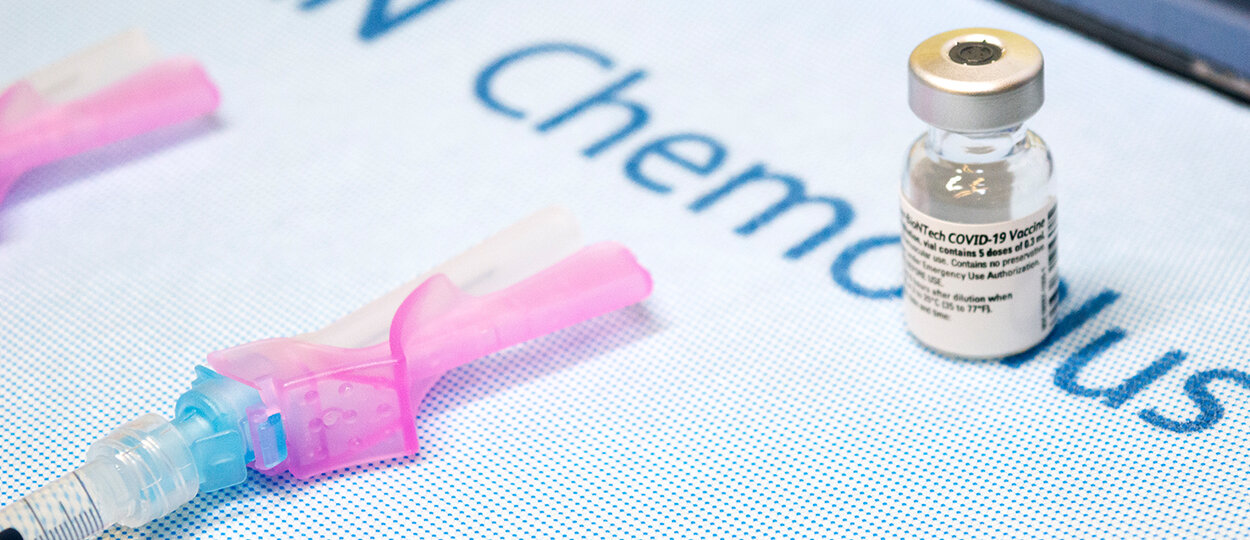By Harvey Gavin
With a file by U of T writer Jim Oldfield.
A lack of transparency in COVID-19 vaccine trials and secrecy over deals between governments and drug companies risk the success of the global pandemic response, new research from Transparency International and the University of Toronto warns.
For Whose Benefit? is an in-depth study published today on the development and sale of the world’s top 20 COVID-19 vaccines, including those developed by AstraZeneca, Pfizer/BioNTech and Moderna.
The report reveals a pattern of poor transparency and a disturbing trend of governments censoring key details of their orders from drug companies, through detailed analysis of clinical trial data and nearly 200 contracts for vaccine sales up to March 2021.
“The lack of transparency of many clinical trials combined with the huge financial incentives for producing effective treatments leaves the door wide open for selective reporting of results or outright data manipulation,” said Jonathan Cushing, head of Transparency International’s global health programme.
“The lack of publicly accessible data creates space for misleading and potentially dangerous half-truths, disinformation, and conspiracy theories, which in turn contribute to vaccine hesitancy,” Cushing said.
With recent Gallup polling showing that one third of the world’s adult population — 1.3 billion people — are unwilling to take a coronavirus vaccine, transparency is vital to build confidence.
Clinical trial transparency is the only way to monitor the safety and efficacy of vaccines, and it is a key safeguard against selective reporting of results or manipulation of data. Yet, analysis of the 86 registered clinical trials for the top 20 vaccines revealed:
- Results from just 45 per cent of these trials were announced.
- Of this figure, 41 per cent provided only top-level results via a press release or press conference, with the full data unavailable for media scrutiny or academic review.
- Clinical trial protocols were published for just 12 per cent of trials. There were no publicly accessible protocols for 88 per cent of the trials and no way of knowing the conditions under which they were carried out.
The report was co-authored by Jillian Kohler, who leads World Health Organization’s Collaborating Centre for Governance, Transparency and Accountability in the Pharmaceutical Sector based at U of T.
“Transparency in clinical trials is always important, but the tempo of the development process for COVID-19 vaccines has been unprecedented, so there is an even greater need for transparency in the current situation,” said Kohler, a professor at U of T’s Leslie Dan Faculty of Pharmacy, Dalla Lana School of Public Health, and the Munk School of Global Affairs & Public Policy.
“Several countries have driven their infection rates sharply down through large-scale vaccine uptake, and better transparency could help further that trend, especially among populations who may be vaccine hesitant,” Kohler said.
The report also highlights poor transparency in contracts between drug companies and governments. Of the handful of contracts that were published, almost all included significant redactions of key information such as total price paid, price per dose and delivery schedules.
Analysis of 183 contracts for 12 different COVID-19 vaccines revealed:
-
Only 7 per cent of vaccine contracts between developers and governments were published through official channels.
- Just one contract (0.5 per cent) was published without redactions. Most feature entire pages of redactions that obscure information of critical public interest.
- There are large disparities in the price paid. For the Oxford/Astra-Zeneca vaccine, upper-middle income economies such as South Africa paid an average of 25 per cent more per dose than high income economies like the European Union.
Cushing said the lack of transparency over the contracts was as disturbing as the poor transparency in the clinical trials
“Hiding contracts from public view or publishing documents filled with redacted text means we don’t know what governments have signed up to,” Cushing said. “Given the huge amounts of public money invested in research and development around the world, citizens have right to know everything about the vaccines their taxes helped to fund.”
The researchers make several recommendations that would improve transparency, boost public confidence, and help secure the long-term success of COVID-19 response:
- National governments should adopt and enforce legislation requiring the pre-registration of all clinical trials and the publication of summary results within 12 months of their completion.
- All governments that have bought vaccines should follow the lead of the United States and publish their contracts.
- Vaccine developers should publish their clinical trial protocols on a publicly accessible registry, if they have not done so already.
- Developers should also only use media to announce clinical trial results in tandem with data analysis published in a peer-reviewed medical journal, trial registry or as a pre-print article.
“As researchers, we want to have impact in terms of academic reports but also in the real world,” Kohler said. “Our report is a roadmap toward better public policy and an informed citizenry, which would serve us well right now and in future global health crises.”
The research was partially funded by a University of Toronto Connaught Global Challenge Award.
More News
Image

PharmD for Pharmacists program opens new doors for clinical pharmacology scientist
Aaron Buaben reconnected with direct patient care and expanded his research skill set, preparing him for new possibilities in pharmacy profession.
Read More
Image

PharmSci grad’s experience opens doors across disciplines—from lab research to industry to health policy
Laura Bennett’s PhD research suggests Alzheimer’s-related protein could help relieve chronic pain.
Read More
Image

New nanomedicine platform “TITUR” shows promise for advancing personalized mRNA cancer therapeutics
Researchers share new study presenting a tumour-customizable mRNA nanomedicine platform that demonstrates efficient mRNA delivery to cancer cells.
Read More
